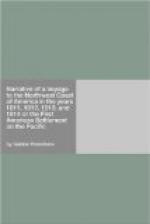On the 5th, in the morning, we came in sight of the Cape-Verd islands, bearing W.N.W., and distant about eight or nine miles, having the coast of Africa to the E.S.E. We should have been very glad to touch at these islands to take in water; but as our vessel was an American bottom, and had on board a number of British subjects, our captain did not think fit to expose himself to meet the English ships-of-war cruising on these coasts, who certainly would not have failed to make a strict search, and to take from us the best part of our crew; which would infallibly have proved disastrous to the object for which we had shipped them.
Speaking of water, I may mention that the rule was to serve it out in rations of a quart a day; but that we were now reduced to a pint and a half. For the rest, our fare consisted of fourteen ounces of hard bread, a pound and a quarter of salt beef or one of pork, per day, and half a pint of souchong tea, with sugar, per man. The pork and beef were served alternately: rice and beans, each once a week; corn-meal pudding with molasses, ditto; on Sundays the steerage passengers were allowed a bottle of Teneriffe wine. All except the four partners, Mr. Lewis, acting as captain’s clerk, and Mr. T. M’Kay, were in the steerage; the cabin containing but six berths, besides the captain’s and first-mate’s state-rooms.
As long as we were near the coast of Africa, we had light and variable winds, and extremely hot weather; on the 8th, we had a dead calm, and saw several sharks round the vessel; we took one which we ate. I found the taste to resemble sturgeon. We experienced on that day an excessive heat, the mercury being at 94 deg. of Fahrenheit. From the 8th to the 11th we had on board a canary bird, which we treated with the greatest care and kindness, but which nevertheless quitted us, probably for a certain death.
The nearer we approached to the equator the more we perceived the heat to increase: on the 16th, in latitude 6 deg., longitude 22 deg. west from Greenwich, the mercury stood at 108 deg.. We discovered on that day a sail bearing down upon us. The next morning she reappeared, and approached within gun-shot. She was a large brig, carrying about twenty guns: we sailed in company all day by a good breeze, all sail spread; but toward evening she dropped astern and altered her course to the S.S.E.
On the 18th, at daybreak, the watch alarmed us by announcing that the same brig which had followed us the day before, was under our lee, a cable’s length off, and seemed desirous of knowing who we were, without showing her own colors. Our captain appeared to be in some alarm; and admitting that she was a better sailer than we, he called all the passengers and crew on deck, the drum beat to quarters, and we feigned to make preparations for combat.
It is well to observe that our vessel mounted ten pieces of cannon, and was pierced for twenty; the forward port-holes were adorned with sham guns. Whether it was our formidable appearance or no, at about ten A.M. the stranger again changed her course, and we soon lost sight of her entirely.




